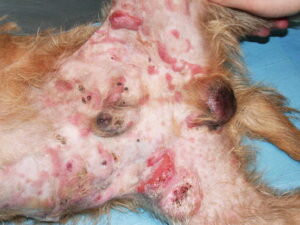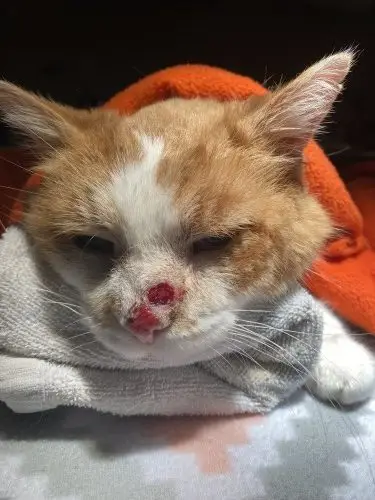Cat and dogs can develop skin cancer lesions like humans. It is estimated that 450 dogs and 120 cats in 1000 are diagnosed with some form of skin cancer: this makes it the most common type of cancer in dogs and the second most common for cats. Not all skin cancers are related to sun exposure but certain pet skin cancers are associated with UV radiation, particularly in non-pigmented skin with poor hair covering.
DOGS:
Exposure to the sun causes higher incidence of two types of skin cancer—squamous cell carcinoma and haemangioma. Light-coloured dogs with thin haircoats that spend time in the sun have a higher risk of developing both these cancers. The ears, bridge of the nose and belly are most vulnerable. There may also be a genetic basis to the cancers. Even if sun damage doesn’t progress to cancer, sunburn in these areas can be very painful and cause skin damage.

Tips:
- Any areas of skin discolouration, scabbing, crusting or a swelling/growth should always be checked by your vet.
- Don’t let white thinly-haired dogs sunbathe.
- If they are out in the sun, particularly in the middle of the day, apply sunblock to vulnerable areas (nose and belly).
- For long days at the beach, t-shirts or special dog covers would be a good idea.

CATS:
The most common sun-related cancer in white cats is solar-induced squamous cell carcinoma. Unpigmented, hairless skin has no protection from the sun’s rays. Areas where the fur is thin; on their ear tips, nose and eyelids are most susceptible to skin cancer. This also includes coloured cats that are white in these areas. However, these cats do not tend to sit in direct sun as long, as they get hotter than completely white cats.
If you see any redness, flaky skin, scabbing or ulceration of the skin on your cat’s ears, nose or eyes have this checked immediately by our vet.
In the early stages this may be pre-cancerous solar dermatitis from chronic exposure to the sun. Aggressive preventive treatment (zinc-free sun block, and confining your cat indoors between 10am—4pm) may prevent this from developing into cancer. Your vet may recommend a skin biopsy, as sun damage can be difficult to visually distinguish from early cancer.
These cancers can be managed aggressively. Treatment includes surgical excision or cryosurgery. This type of cancer does not usually spread to other areas of the body, but it spreads quickly locally. Managing advanced cancer on the eyelids or nose is extremely difficult as the cancer invades a large amount of tissue which is problematic to remove.



